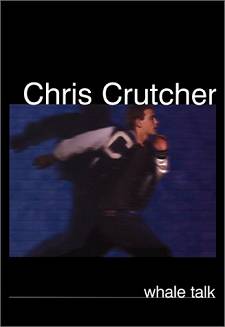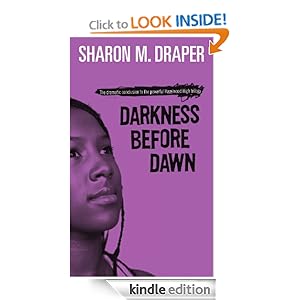 There's bad news and good news about the Cutter High School swim team. The bad news is they don't have a pool. The good news is that only one of them can swim anyway.
There's bad news and good news about the Cutter High School swim team. The bad news is they don't have a pool. The good news is that only one of them can swim anyway.A group of misfits brought together by T.J. Jones (the J is redundant), the Cutter All Night Mermen struggle to find their places in a school that has no place for them. T.J. is convinced that a varsity letter jacket--unattainable for most, exclusive, revered, the symbol (as far as T.J. is concerned) of all that is screwed up at Cutter High--will be an effective tool. He's right. He's also wrong.
Still it's always the quest that counts. And the bus on which the Mermen travel to swim meets soon becomes the space where they gradually allow themselves to talk, to fit, to grow.
Together they'll fight for dignity in a world where tragedy and comedy dance side by side, where a moment's inattention can bring lifelong heartache, and where true acceptance is the only prescription for what ails us.
T.J. Jones has had one set goal throughout his academic high school career. Not to play sports. He's very good at athletics, in fact he's better than most others, but he doesn't like to be told what to do which contradicts all sports and their coaches. So, he only participates in recreation sports--pick up basketball games, a local tournament or two, but he has never played for his school, Cutter High. But for whatever reason unbeknownst to us, when Mr. Simet approaches T.J. about his idea for starting a swim team for Cutter High, T. J. entertains the idea.
It's odd that T.J. Jones has compiled a group of misfits who have never belonged together more than they do now. As the team travels to swimming competitions, the bus rides become "group therapy sessions." What first began as T.J.'s mission to have the swim team, the Mermen, earn the coveted letter jackets, has soon turned into blossoming friendships and a support system he needs--as well as all the other students. T.J. also takes pleasure working with children who are physically, emotionally, or otherwise abused. Heidi, a traumatized child who repeatedly tries to wash the brown off her skin (she is biracial) has been emotionally abused by T.J.'s archenemy: Rich Marshall, who is an athletic all-star, racist, stalker, psychopathic, pos (piece of *hit!). [The author does an incredible job getting the reader to hate this guy...and I hated him. I hated him, because I know so many people who are just like him, it scares me.]
More than anything, this is a novel "warning [me] that this kind of pain exists in the world." (page 131) As T.J. is having a very intimate conversation with his father, his dad says probably the most profound explanation I've read (to date) on being understood. He says,
A whale unleashes his cry, and it travels hundreds or even thousands of miles. Every whale in the ocean will at one time or another run into that song. And I figure whales probably don't edit. If they think it, they say it. If some man-whale cheats on his wife, her anguish, her rage, her despair, is heard and understood by every whale who swims into the range of her voice. The joy of lovemaking, the crippling heartache of a lost child--it's all heard and understood. Predators and prey have equal voice. The Mother Teresa whales and the Jeffrey Dahmer whales all have their say. Whale talk is the truth, and in a very short period of time, if you're a whale, you know exactly what it is to be you. (page 131)
Themes that are prominent throughout the novel are bullying, racism, abandonment, anger, overcoming tragedy. I was completely taken by surprise by its ending. I can say its one of the best books I've read!
*There is explicit language used throughout the novel.
You can buy Whale Talk here. Visit Chris Crutcher's website here.




